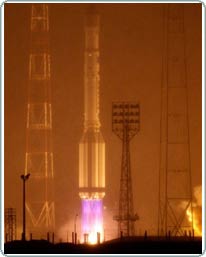Russia successfully launched 3 satellites in GLONASS global positioning system
 On the night of 25th and the morning of 26th, a Russian Proton rocket was launched with three satellites in GLONASS satellite navigation system from Baikonour airport (Kazakhstan).
On the night of 25th and the morning of 26th, a Russian Proton rocket was launched with three satellites in GLONASS satellite navigation system from Baikonour airport (Kazakhstan).
Proton-K rocket took off at 20: 18 GMT the night of December 25 and a few minutes later separated from 3 Glonass-M satellites and a rocket that pushed them into orbit.
Glonass-M satellites will operate for about 7 years. The GLONASS system developed by the Russian army in the 1980s is considered a competitor to the US GPS system and the European Galileo system in the future.
The GLONASS system has been operating since 1993 and will focus on 24 space satellites from now to 2009. However, with 18 satellites, this system can serve the military as well as in the civilian field. The introduction of these three new satellites has increased the total number of satellites to 17.
GLONASS system allows positioning at a distance of 1m and determines the speed of people and objects on land and sea.
Power
- Russia's Glonass system has global coverage
- Russia launched 4 more satellites in 2013
- Russia successfully launched a positioning satellite
- Russia fired a geolocation satellite of Glonass
- Russia launched into three new satellites orbits
- Russia's global positioning system
- Russia launched Glonass-M navigation satellite
- China launched the 10th positioning satellite
- America will upgrade the global positioning system
- Russia will launch 11 more satellite satellites
- 3 Glonass satellites of Russia fall into the Pacific Ocean
- China successfully launched two Bac Dau 2 satellites
 Van Allen's belt and evidence that the Apollo 11 mission to the Moon was myth
Van Allen's belt and evidence that the Apollo 11 mission to the Moon was myth The levels of civilization in the universe (Kardashev scale)
The levels of civilization in the universe (Kardashev scale) Today Mars, the sun and the Earth are aligned
Today Mars, the sun and the Earth are aligned The Amazon owner announced a secret plan to build a space base for thousands of people
The Amazon owner announced a secret plan to build a space base for thousands of people